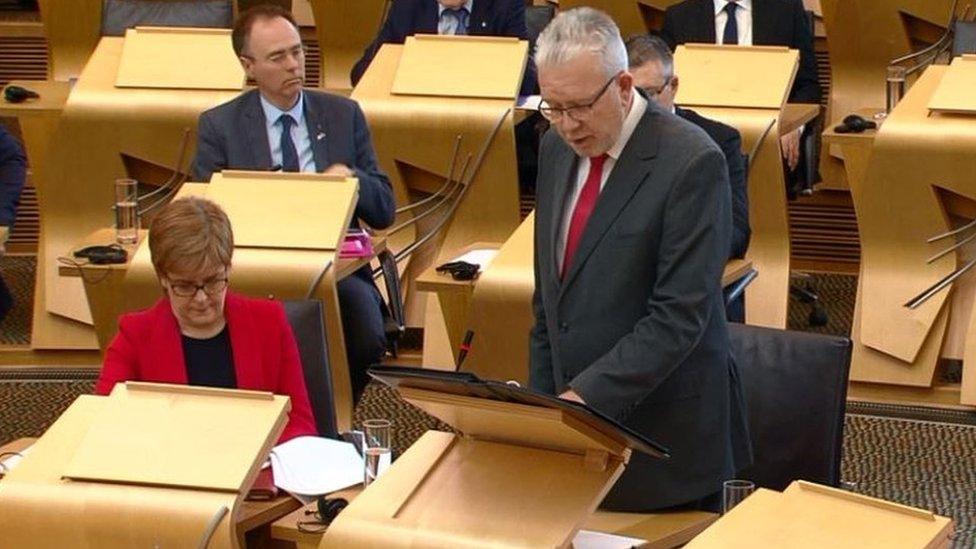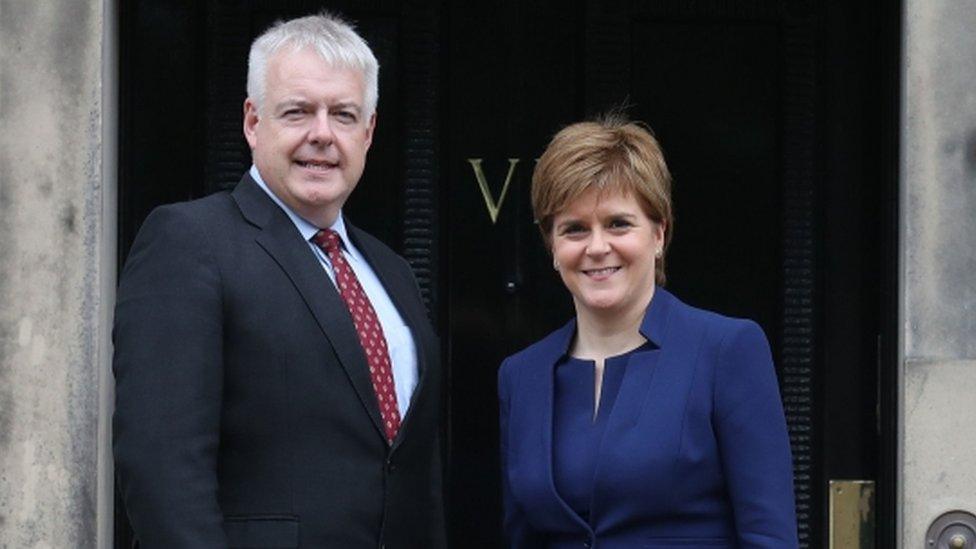Where does the Welsh Brexit deal leave Scotland?
- Published

It was, with caveats to which we shall come shortly, a customarily confident and effective performance by Mike Russell, the Minister for Mitigating Brexit (to give him his decidedly informal title.)
Speaking in Holyrood, he explained his presence there - or rather his absence from talks in London which had been pencilled in the diary in order to finalise negotiations with regard to the return of devolved powers post Brexit.
Mr Russell's absence was readily explained. He has said in the past that he is fed up attending meetings with the UK government where the principal item on the agenda is the date for the next meeting.
He was on secure ground, too, when talking about the origins of this controversy. The determination of the Scottish government to defend the devolution settlement against a "crude power grab".
The previous decision of the relevant Holyrood committee to say that the present EU Withdrawal Bill at Westminster was unacceptable in that it unreasonably held back EU powers in devolved area such as farming.
The minister noted that this committee decision had been unanimous, glancing meaningfully at the Tories, as he did so.
It was an implicit warning to the Conservatives not to shift ground. (They have, arguing that UK Ministers have moved and that it is the SNP which is now being stubborn.)

Carwyn Jones has agreed a deal with the UK government - but Nicola Sturgeon has not
Remember the background? Powers in devolved areas returning from Brussels. Should they go straight to Edinburgh? Or should they, as UK Ministers contend, rest in London while replacement UK frameworks are created?
Clear distinction. For UK Ministers, this is about cutting a deal, if they can. For Scottish Ministers, this is about principle. These are devolved powers. They should go to Edinburgh, no ifs, an absence of buts. There could then be, by consent, UK frameworks to which they are not remotely averse.
Why, Mr Russell asked, did there have to be constraints placed upon Holyrood's power to legislate in these returning areas, perhaps for up to seven years, when the limits placed on Westminster legislation for England were by voluntary agreement? Not, he implied, fair.
All clear so far? Question of principle. Not amenable to cutting a deal, whereby the two sides split the difference.
But then arise the caveats. Firstly, Mr Russell has relied thus far upon a comparable stance being taken in Wales, by the Labour-led administration. This has helped bolster his argument that this is not a Nationalist gesture, that it is a concern shared by devolved legislatures.
Welsh agreement
However, opposition MSPs raised speculation - since confirmed - that the departing Welsh First Minister Carwyn Jones has reached an agreement.
Where, opponents helpfully asked Mr Russell, would this leave Scotland? Unflustered but plainly under a little pressure, Mr Russell said that Wales must go its own course but that the two devolved nations would continue to work together.
Then caveat number two. There had been substantial expectation at the end of last week that there would be a meeting of the Joint Ministerial Committee (EU Negotiations) - JMC (EN) - today. And that it would herald a deal.
That speculation slowly died over the last 48 hours or so. What, those same helpful opponents inquired, had caused this? Had Mr Russell also been ready to deal - but been over-ruled by the first minister?
Mr Russell was repeatedly asked for his view on this. With comparable frequency, he issued a denial, at one point confining his answer to the single word "No".
Indeed, he had sought to pre-empt such challenges by insisting in his statement that the Scottish government had been "absolutely and unanimously clear" about the need to preserve the principle of devolution.
So where are we now? We have learned that the Welsh have struck a deal. We will learn more from the UK government as to how they intend to proceed.
Mr Russell, meanwhile, is advancing two possible solutions. One, drop Clause 11 (the bit of the Bill which deals with devolved powers) - while penning a written agreement between Edinburgh and London that the two governments will not legislate in these returning areas while the frameworks are built.
Two, stick to the present system of rules and regulations - while agreeing constraint on any legislation north or south of the border; in essence, that both would require mutual consent.
The minister characterised these as "practical and workable" solutions. There are of course alternatives.
There may yet be a deal between Edinburgh and London which would permit the Scottish Parliament to consent to a revised bill in Westminster. In reality, the deadline for this is mid-May, prior to Third Reading in the Lords.
That would mean Holyrood drops the Continuity Bill, allowing these powers to be written into Scots Law. You will remember that bill is now the subject of a UK government challenge in the Supreme Court.
Or there could be no deal. And the Continuity Bill is upheld by the Supreme Court allowing Holyrood to proceed.
Or there could be no deal. The Continuity Bill could be struck down. And Westminster could use its sovereign powers to legislate for the whole of the UK, without Holyrood consent.